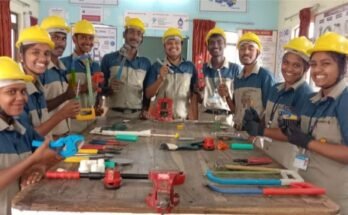We live in a world marked by rapid changes in technology, automation, and globalization where cars drive themselves, machines read X-rays, and chatbots respond to customers’ queries. The world is at the cusp of transformation and these rapid advancements in technology accelerated by the COVID-19 crisis have brought about a drastic change in our lives, holding the potential to unleash multiple opportunities, and challenges for humankind.
This new technology-driven world has forced organizations and individuals to adapt and evolve in order to succeed. Those who have failed to adapt found themselves at the receiving end and perished. This requires workers to undergo tremendous changes in the way they work, unlearn, and learn new things in order to stay relevant.
Future of Skills refers to the skill sets required by individuals to flourish and remain competitive in the ever-changing world, that we live in. It encompasses skills and competencies that will become pivotal and in demand due to changes in technology, automation, AI, globalization, and unprecedented situations like the COVID-19 pandemic. The need for manual and mundane tasks will decline and jobs that require cognitive, complex problem-solving, analytical thinking, and emotional intelligence will see a rise. As per the Future of Jobs Report 2023 by the World Economic Forum (WEF), the fastest declining job roles are clerical or secretarial roles, data entry operators, etc., whereas, job roles like digital transformation specialist, e-commerce specialist, digital marketing specialist, and strategy specialist will see growth. According to a report by McKinsey & Company, 56 foundational skills will be required by individuals to thrive in the future of work. These skills have been grouped across 13 skills groups and four categories, namely- Cognitive, Interpersonal, Self-leadership, and Digital.
We need to realize that continuous reskilling and upskilling is an important pathway to success. Not only this, efforts should be made to make skilling initiatives agile and responsible. As Mr. Atul Kumar Tiwari, Secretary, Ministry of Skill Development and Entrepreneurship said – “The New Education Policy, with the twin drivers of National Curriculum Framework and the Credit Framework, on one hand, and the convening of vocational, experiential and academic education, on the other hand, are setting the stage for this change”.
Some of the steps that can be taken to make sure that individuals acquire the skills that are required in the future world of work are:
- While NEP is a step in the right direction, governments should review and update the existing curriculum to focus more strongly on the future skills required
- Research and innovation institutions should be set up by the government to identify how to best develop such skills
- Redefining the adult training programs to take into account the upcoming skills and incorporate innovative learning methods. A dynamic skill-based certification system should be developed to add or remove the skills that are required to perform a certain job role
- Lastly, although children have access to primary and secondary education early education is still unaffordable to many. Also, only a few countries have a system to ensure affordable access to adult training. Hence, to ensure life-long learning, governments should focus on universalizing high-quality and affordable education from early childhood to retirement that will future-proof citizens in the new world of work.
(Disclaimer: The views expressed in the article above are those of the authors Ms. Iqra Salim, Senior Analyst, IPE Global Ltd and Ms. Pommi Biswas, Manager, IPE Global Ltd. The matter and intent of this article has not been edited by skillreporter.com. Skill Reporter shall not be responsible for any damage if caused to any person/ organization directly or indirectly.)



